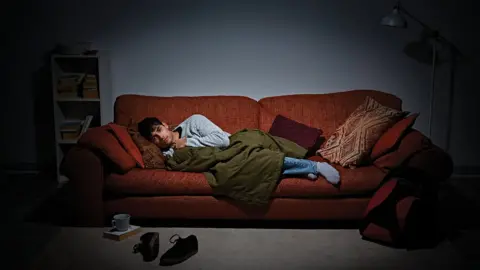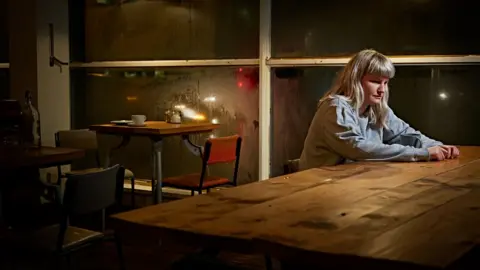Hidden homeless campaign launched by Welsh Government
 Welsh Government/Shelter Cymru
Welsh Government/Shelter CymruA campaign to raise awareness of and tackle hidden homelessness has been launched by the Welsh Government.
Examples can include people who are staying on a friend's sofa, in a hostel or a night shelter, rather than sleeping rough on the streets.
Figures published by Crisis estimated 3,250 households in Wales "sofa surf" on any given night.
The Welsh Government said there was a greater risk of exploitation for these people trying to find a place to stay.
Emily Hattersley became homeless at 16 and said "sofa surfing" had an "immense effect" on her and only looking back can she see she was actually homeless.
"You kind of feel like you're living off the back of everybody. People were housing me off their own backs and they were paying for me to have showers, paying for meals for me. I felt really guilty that I had asked them to do that for me," she added.
Ms Hattersley believes she was "lucky" as she had access to support which allowed her to go to college and university, but said more needed to be done to help young homeless people with their mental health.
Housing Minister Julie James said many young people experiencing, or at risk of, homelessness did not recognise what was happening.
"If you don't have a place to call home it is likely that you are experiencing hidden homelessness," she said.
"So if you think you're experiencing hidden homelessness or you're at risk of it then get help now. It's never too late or too early to get help."
 Welsh Government/Shelter Cymru
Welsh Government/Shelter CymruThe campaign is also targeting those who come in to contact with young people to make sure they know the signs of hidden homelessness and can encourage them to get help from Shelter Cymru.
Signs include:
- Difficulties with parental and close family relationships
- Reluctance to go home
- Keeping belongings with them and difficulty keeping clothes clean
- Asking for help with money and using food banks
- Loss of job
- Mental or physical health problems
The Welsh Government's strategy said it needed to "understand the scale of the problem to ensure an adequate response".
"The statutory homelessness statistics provide part of the picture, but this only accounts for those individuals presenting to services," it added.
"We know there are far more individuals who are hidden from services, 'sofa surfing' or in temporary and insecure accommodation."
It said it funded Shelter Cymru to provide independent housing advice and support.
Shelter Cymru's director, Jon Puzey, said: "We know the earlier and more often someone experiences homelessness, the more likely they are to develop complex issues that might mean they become homeless repeatedly throughout their adult life.
"That's why it's so important that we make it a priority to prevent youth homelessness."
